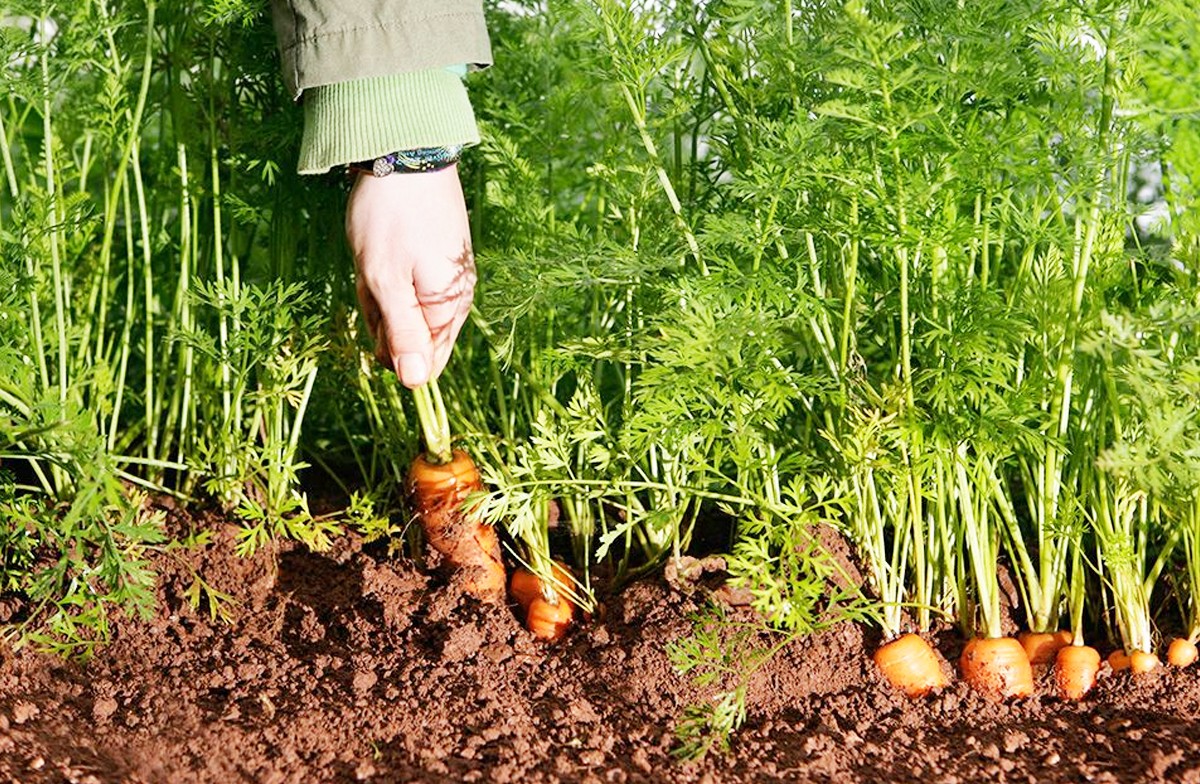Carrot
Carrots (Daucus carota) are root vegetables known for their bright orange color and sweet taste. They are rich in nutrients and have several health benefits. Here's some information on growing carrot plants:
- Planting Time: Carrots are cool-season crops that thrive in moderate temperatures. They can be planted in early spring or late summer/early fall, depending on your climate. Aim for a soil temperature between 45°F (7°C) and 85°F (29°C) for optimal germination.
- Soil Preparation: Carrots prefer loose, well-drained soil that is free of rocks, debris, and clumps. Remove any weeds and work the soil to a depth of 8 to 10 inches (20 to 25 cm) using a garden fork or tiller. Incorporate organic matter such as compost or well-rotted manure to improve soil fertility and structure.
- Seed Sowing: Carrot seeds are small and need to be sown directly into the garden bed. Create shallow furrows in the soil, about ¼ to ½ inch (0.6 to 1.3 cm) deep. Space the furrows about 2 to 3 inches (5 to 7.5 cm) apart. Scatter the carrot seeds thinly along the furrows and cover them with a thin layer of soil.
- Watering: After sowing the seeds, water the soil gently but thoroughly to ensure even moisture. Keep the soil consistently moist during the germination period, which usually takes about 7 to 14 days. Once the carrot seedlings are established, maintain moderate and consistent soil moisture.
- Thinning: Once the carrot seedlings have developed their first true leaves, thin them to provide enough space for root development. Carrots need room to grow, so thin the seedlings to about 2 to 3 inches (5 to 7.5 cm) apart. Removing excess seedlings helps avoid overcrowding and competition for nutrients.
- Mulching and Weed Control: Applying a layer of organic mulch, such as straw or wood chips, around the carrot plants helps retain soil moisture, suppress weed growth, and regulate soil temperature. Weed regularly to prevent weeds from competing with the carrots for nutrients and space.
- Harvesting: Carrots are usually ready for harvest between 60 to 80 days after planting, depending on the variety. They can be harvested when the roots have reached the desired size and color. Gently loosen the soil around the carrots with a garden fork, then carefully lift them out of the ground. Trim off the greens and store the carrots in a cool, dry place.
By following these guidelines, you can enjoy growing your own fresh and flavorful carrots in your garden. Remember to choose carrot varieties suitable for your climate and consider experimenting with different colors and shapes for a diverse harvest.
In natural health, carrots (Daucus carota) are known as "Hu Luo Bo" and are valued for their medicinal properties. Carrots are considered to have a cooling effect and are used to nourish and support various organs and systems in the body. Here are some ways carrots are used in natural health:
- Nourishing the Spleen and Stomach: Carrots are believed to strengthen the spleen and stomach, which are considered the foundation of digestion and nutrient absorption in natural health. They are often used to support digestion, improve appetite, and alleviate symptoms of indigestion or poor digestion.
- Moisturizing the Lungs: Carrots are considered beneficial for lung health. They are believed to have a moisturizing effect on the lungs and can be used to soothe coughs, relieve dryness, and promote respiratory health.
- Clearing Heat: Carrots are thought to have a cooling and detoxifying effect. They are used to clear heat and toxins from the body, which can manifest as symptoms such as skin irritations, inflammation, or fever.
- Promoting Qi Circulation: In natural health, carrots are believed to promote the circulation of Qi (energy) in the body. They are used to invigorate and move stagnant Qi, which can help alleviate symptoms such as bloating, stagnation, or discomfort.
- Nourishing Blood: Carrots are considered to have blood-nourishing properties. They are used to promote the production of blood and improve blood circulation. Carrots are often recommended for individuals with blood deficiency or anemia.
- Eye Health: Carrots are known for their high beta-carotene content, which the body converts into vitamin A. In natural health, carrots are believed to nourish the liver and improve visual health, including the health of the eyes.
Carrots nutritional benefits
Carrots are highly nutritious and offer numerous health benefits. Here are some key nutritional benefits of carrots:
- Vitamins and Minerals: Carrots are rich in various vitamins and minerals. They are an excellent source of vitamin A, providing beta-carotene, which is converted into vitamin A in the body. Carrots also contain vitamin K, vitamin C, vitamin E, and several B vitamins. In terms of minerals, carrots are particularly high in potassium, as well as containing smaller amounts of calcium, magnesium, phosphorus, and trace minerals like manganese and zinc.
- Antioxidants: Carrots are loaded with antioxidants, including beta-carotene, alpha-carotene, lutein, and lycopene. These antioxidants help protect cells from oxidative damage caused by free radicals and can support overall health and well-being. Beta-carotene, in particular, is known for its role in promoting eye health and supporting immune function.
- Eye Health: Carrots are often associated with promoting good vision, and this is because of their high beta-carotene content. Beta-carotene is converted into vitamin A in the body, which is essential for maintaining healthy eyesight. Adequate vitamin A intake helps protect the cornea, supports night vision, and may reduce the risk of age-related macular degeneration (AMD) and cataracts.
- Fiber Content: Carrots are a good source of dietary fiber, both soluble and insoluble. Fiber promotes healthy digestion, helps regulate bowel movements, and supports gut health. It can also contribute to a feeling of fullness, aiding in weight management and preventing overeating.
- Heart Health: The antioxidants and fiber in carrots contribute to heart health. The high potassium content of carrots helps maintain healthy blood pressure levels, and the fiber content can help lower cholesterol levels by reducing the absorption of dietary cholesterol.
- Skin Health: The antioxidants in carrots, particularly beta-carotene and vitamin C, promote healthy skin. These nutrients help protect the skin against damage from free radicals and environmental factors. They also support collagen production, which is important for maintaining skin elasticity and preventing signs of aging.
Carrots pharmacological action
Carrots (Daucus carota) contain various bioactive compounds that contribute to their pharmacological actions and potential health benefits. Here are some pharmacological actions associated with carrots:
- Antioxidant Activity: Carrots are rich in antioxidants, including carotenoids like beta-carotene, alpha-carotene, and lutein, as well as vitamin C and other phenolic compounds. These antioxidants help protect cells from oxidative damage caused by free radicals, reducing the risk of chronic diseases such as cardiovascular disease, cancer, and age-related macular degeneration.
- Anti-inflammatory Effects: Some compounds found in carrots, such as falcarinol and falcarindiol, have been shown to possess anti-inflammatory properties. These compounds may help reduce inflammation in the body and contribute to the management of inflammatory conditions.
- Immunomodulatory Activity: Carrots contain nutrients like beta-carotene and vitamin C, which support immune function. Beta-carotene is converted into vitamin A in the body, which is essential for the normal functioning of the immune system. Vitamin C, on the other hand, plays a crucial role in supporting the production and function of immune cells.
- Cardiovascular Health: The antioxidant and anti-inflammatory properties of carrots contribute to their potential cardiovascular benefits. Carrots, particularly their bioactive compounds like beta-carotene and polyphenols, have been associated with a reduced risk of cardiovascular diseases by helping to lower blood pressure, improve lipid profile, and protect against the oxidation of LDL cholesterol.
- Digestive Health: Carrots are a good source of dietary fiber, which aids in maintaining healthy digestion and promoting regular bowel movements. The fiber content of carrots supports gut health, helps prevent constipation, and may contribute to the prevention of certain gastrointestinal disorders.
- Anticancer Potential: Some studies suggest that the bioactive compounds in carrots, including carotenoids and polyphenols, possess anticancer properties. They may help inhibit the growth of cancer cells, protect against DNA damage, and promote detoxification processes in the body.
In Person With Heshoutang Natural Health Members
With Heshoutang Natural Health Online Members
Fill Out the Questionnaire by yourself
How to plant carrots
To plant carrots, follow these steps:
- Choose the right time: Carrots are cool-season crops that prefer moderate temperatures. They can be planted in early spring as soon as the soil is workable or in late summer for a fall crop. Avoid planting in hot summer months.
- Prepare the soil: Carrots thrive in loose, well-draining soil that is free from rocks and debris. Remove any weeds and break up the soil to a depth of about 8 to 10 inches (20 to 25 cm) using a garden fork or tiller. Remove any large clumps or stones.
- Sow the seeds: Carrot seeds are small, so they should be sown directly into the garden bed. Create furrows in the soil about ½ inch (1.3 cm) deep and 2 to 3 inches (5 to 7.5 cm) apart. Sow the carrot seeds thinly along the furrows, aiming for a spacing of about 1 inch (2.5 cm) between seeds.
- Cover and water: Cover the seeds with a thin layer of soil or vermiculite. Water gently but thoroughly to ensure even moisture. Be careful not to wash away the seeds. Keep the soil consistently moist during the germination period, which typically takes about 7 to 14 days.
- Thin the seedlings: Once the carrot seedlings have developed their first true leaves, thin them to provide enough space for the roots to grow. Carrots need room to develop properly, so thin the seedlings to about 2 to 3 inches (5 to 7.5 cm) apart. Remove the weaker or overcrowded seedlings, which can be done by gently pulling them out of the soil.
- Mulch and weed control: Apply a layer of organic mulch, such as straw or wood chips, around the carrot plants. This helps retain soil moisture, suppress weed growth, and regulate soil temperature. Regularly remove any weeds that may compete with the carrots for nutrients and space.
- Watering and maintenance: Keep the soil consistently moist throughout the growing season. Water deeply whenever the top inch (2.5 cm) of soil feels dry. Avoid overwatering, as it can cause the carrots to crack or develop rot. Monitor for pests and diseases and take appropriate measures to control them.
- Harvesting: Carrots are typically ready for harvest in 60 to 80 days, depending on the variety. The size and color of the roots indicate their readiness. Gently loosen the soil around the carrots using a garden fork or your hands, and carefully lift them out of the ground. Trim off the tops, and store the carrots in a cool, humid place.
By following these steps, you can successfully grow your own delicious and nutritious carrots in your garden. Remember to choose carrot varieties suitable for your region and consider the desired size and shape of the carrots you prefer.
When you subscribe to the blog, we will send you an e-mail when there are new updates on the site so you wouldn't miss them.


















Comments